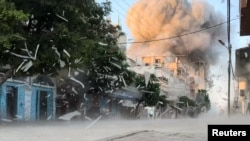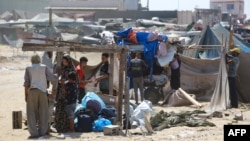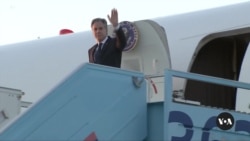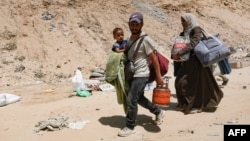Israeli strikes killed 28 Palestinian civilians in new fighting in Gaza, including a woman and her six children, Palestinian health officials said.
The strike came ahead of another visit to the region by U.S. Secretary of State Antony Blinken in a renewed push to reach agreement on an elusive cease-fire deal to halt the 10-month Israel-Hamas war.
The long-running cease-fire talks have lasted for months. Officials on numerous occasions have said the discussions were close to a resolution but then were never finished. The United States and fellow mediators Egypt and Qatar said they were closing in on a deal after two days of talks in Doha last week, but Hamas signaled resistance to what it contended were new demands by Israel. The talks are set to resume in Cairo in the coming days.
Speaking to his Cabinet, Israeli Prime Minister Benjamin Netanyahu accused Hamas of being "obstinate" in negotiations for a cease-fire deal and called for more attacks on the Palestinian militant group.
"Hamas, up to this moment, remains obstinate,” Netanyahu said. “It has not even sent a representative to the talks in Doha. Therefore, the pressure should be directed at Hamas and (Yahya) Sinwar, not at the Israeli government," he added, referring to the newly appointed Hamas chief.
"We are conducting negotiations and not a scenario in which we just give and give,” the Israeli leader said. “The principles we have determined are vital for the security of Israel."
The basic outline of a cease-fire deal remains the same. It is a three-phase process in which fighting would be halted for six weeks, while Hamas would begin to release the estimated 110 hostages it is still holding — including about 70 of them living — and Israel would free hundreds of Palestinians it has jailed.
The mediators are hoping to end the war that started October 7 with the shock Hamas attack on Israel that killed about 1,200 people and led to the capture of about 250 hostages. Israel’s counteroffensive has killed more than 40,000 Palestinians, most of them women and children, according to Hamas-controlled health authorities. The Israeli military says that death toll includes thousands of Hamas militants it has killed.
The majority of Gaza’s 2.3 million residents have been displaced in the fighting, many of them more than once, and caused a humanitarian catastrophe. Experts have warned of famine and the outbreak of polio and other diseases.
Watch related report by Veronica Balderas Iglesias:
Blinken arrived in Tel Aviv on Sunday, his ninth trip to the region since the hostilities started. He is set to meet with Netanyahu on Monday.
The U.S., Israel’s chief arms supplier, has repeatedly called for adoption of the cease-fire proposal and played a key role in the negotiations but has not been able to bring them to a close as the war rages.
A senior White House official said the cease-fire talks were at an “inflection point” and a “critical time.”
“The secretary is going to use this trip, starting with Israel, to just continue to stress the importance of getting this done,” the official said, adding that he would “press to any and all parties that it's important to get the remaining pieces of this across the finish line.”
“I think it is apparent that a deal would not only be in the interest of the Israeli people but would also help alleviate some of the suffering in Gaza,” the official said. “We're going to raise all of these issues directly.”
A strike early Sunday on a home in the central town of Deir al-Balah killed a woman and her six children, who included a set of 10-year-old quintuplets, according to Palestinian officials.
Another strike east of Deir al-Balah killed at least four people, according to an Associated Press journalist at the hospital.
Elsewhere, a strike in the northern town of Jabaliya hit two apartments in a residential building, killing two men, a woman and her daughter, according to Gaza's health ministry. Another two strikes in central Gaza killed nine people, according to Al-Awda Hospital. Late Saturday, a strike near the southern city of Khan Younis killed four people from the same family, including two women, according to Nasser Hospital.
Israel has repeatedly said during the war that it only targets militants and blames civilian deaths on Hamas because the militant group conceals fighters, weapons, tunnels and rockets in residential areas. The Israeli military said it killed 20 militants in the attacks Saturday night into Sunday.
The effort to end the fighting has gained new urgency to prevent a regional war in the Middle East after two top militants were killed in the last month. Israel acknowledged responsibility for an attack in Beirut that killed a Hezbollah commander, while Iran accused Israel of assassinating Hamas political leader Ismail Haniyeh in Tehran. Haniyeh, who was visiting Iran for the inauguration of the country’s new president, had played a key role in the cease-fire talks.
So far, neither Iranian-funded Hezbollah militants in Lebanon nor Iran itself has responded militarily to the attacks.
Some material in this report came from The Associated Press, Reuters and Agence France-Presse.









